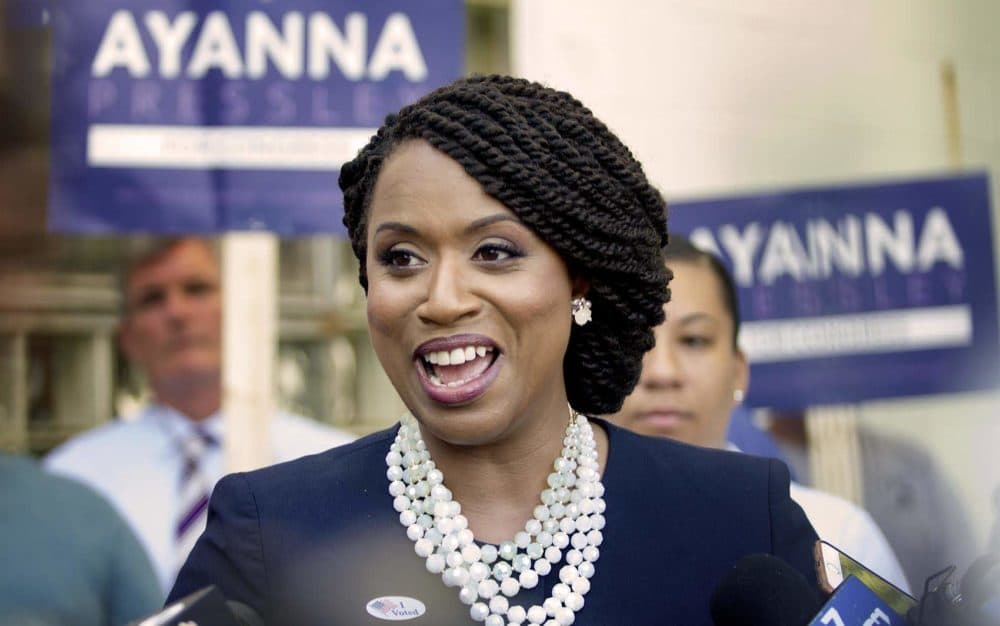Advertisement
Commentary
How Ayanna Pressley Won

With her primary win this week, Ayanna Pressley will almost certainly become the first woman of color elected to Congress in the 230-year history of the commonwealth. Her victory provided a renewed hope and inspired vision to women of color across the district — that the doors of power are no longer closed.
“I knew I would be demonized as entitled, and what no woman can ever be --ambitious,” said Pressley in her election night address. “But change can’t wait.”
The results also signaled a dramatic change in how to run a successful campaign in a minority-majority district.
Pressley was outspent by her opponent, Rep. Michael Capuano, a 10-term incumbent endorsed by much of the Democratic establishment. Pressley’s campaign raised $890,000, compared to Capuano’s $1.7 million, which came, in part, from PACs, according to the Center for Responsive Politics.
Pressley refused to accept corporate PAC money and did not run any ads on mainstream television. Instead, she used an aggressive, multilingual communications strategy ...
Pressley refused to accept corporate PAC money and did not run any ads on mainstream television. Instead, she used an aggressive, multilingual communications strategy to reach residents through Spanish, Haitian, Chinese and African-American media outlets that many campaigns overlook. She also ran viral digital ads to reach new and younger voters in multiple languages. (Disclosure: My consulting firm helped design and implement this strategy.)
Pressley was the top vote-getter in three consecutive elections for the Boston City Council. She used that experience to re-engage her supporters and turn out tens of thousands of new voters in the primary.
Pressley also upended the way candidates traditionally approach the media. Pressley’s only TV ads were in Spanish, running on Telemundo and Univision, and featured well-known Latino community members supporting her candidacy. Her campaign relied heavily on media coverage, taking advantage of opportunities to share her message with national and ethnic outlets that came calling following the election of Alexandria Ocasio-Cortez in New York.
She also talked about issues prioritized by young people and people of color, including gun violence prevention, abolishing ICE, systemic racism and income inequality — all under her mantra of “Change Can’t Wait.” These stories were shared thousands of times on social media, informing and motivating voters who do not rely on mainstream media, including newspapers and television, to get their daily news.
By contrast, Capuano spent heavily on network TV and cable; running a spot featuring supporters with signs highlighting his progressive voting record. Capuano’s strategy was clearly targeting older white voters who have traditionally made up the largest and most reliable share of the vote in previous primaries.
This strategy represented a failure to acknowledge two facts: First, that the demographics of the district has changed, and second, that the way people get their information has also evolved.
And Capuano wasn’t the only one.
Eighty percent of the 50 unnamed “political insiders” polled by WGBH’s David Bernstein predicted that Capuano would win. They also (wrongly) predicted that the only white male in the five-person Suffolk County district attorney’s race would win (Rachael Rollins, a woman of color, ultimately won the seat). Perhaps these “political insiders” thought the candidates of color didn’t have the resources to pay for the expensive pollsters, opposition research and big money TV ad buys they believe are necessary for success.
Pressley’s 17-point victory over Capuano represented a 30-point swing from the prediction of the final MassINC poll conducted for WBUR.
But Pressley didn’t fall into that trap, running a lean campaign that shattered all polling forecasts. Pressley’s 17-point victory over Capuano represented a 30-point swing from the prediction of the final MassINC poll conducted for WBUR.
Pollsters also must change their ways in the wake of another miscalculation to ensure they do not overlook communities of color. One-third of Boston residents speak a language other than English at home, and while it’s expensive to poll in multiple languages, pollsters must do so to account for the many languages spoken across the district.
Additionally, the common method of polling “frequent” voters misses those people not typically engaged by traditional campaigns, leading to a gross miscalculation of a campaign like Pressley’s — which was built upon targeting precisely those voters.
As a result, residents of communities including Chelsea, Dorchester, East Boston, Roxbury and Mattapan often end up underrepresented in the polls. Pressley and other candidates on the ballot, turned many of those voters out for the first time in years — or maybe ever — on Sept. 4.
The 7th district primary results should encourage all campaigns to better incorporate and engage people of color, those who speak English as a second language and young people who often feel like their vote doesn’t matter.
If they do, they could send the next Alexandria Ocasio-Cortez or the next Ayanna Pressley to Congress.
Correction: An earlier version of this commentary misspelled Rachael Rollins' first name. We regret the error.
Josiane Martinez is founder and CEO of Archipelago Strategies Group and served as a consultant to Pressley’s campaign.
This article was originally published on September 07, 2018.
